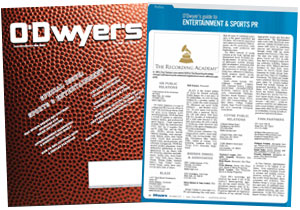|
|
Like millions of television viewers, I eagerly anticipated the final episode of AMC’s “Mad Men” earlier this year.
While some will argue that it presented a far too simplistic view of advertising and ignored basic principles such as honesty, integrity and transparency that are the very foundation of our business, the Emmy Award-winning show’s entertainment impact is undeniable. Masterful writing and producing, a stellar cast, careful attention to detail, and all the wonderful nuances and subtleties were signature trademarks of this highly-acclaimed series. Over the course of seven seasons, the show romanticized smoking, drinking and womanizing and pointed out the bigotry, racism and sexism that existed at that time.
|
|
I particularly enjoyed the show’s final scene showing Don Draper sitting in the Lotus position with his eyes closed, chanting, before the image cut to the iconic Coca-Cola “Hilltop” TV spot, implying that the show’s protagonist returned to New York and McCann-Erickson after his Jack Kerouac-esque road trip to create one of the most famous ads of all time.
While the show focused primarily on the advertising side of our business, there are a number of timeless lessons that can be taken to heart by public relations professionals. As Don said many times … “If you don’t like what’s being said, change the conversation.”
New business
Ah yes, the thrill of the hunt, which was an important theme of the show throughout its seven-year run.
Who can forget Don landing the Kodak account by positioning its new product not as a wheel but as a “Carousel,” making an emotional connection between the product by using his own family photos to bring its benefits to life, or Peggy Olsen’s nostalgic presentation to Burger Chef positioning the restaurant as a family dining “experience.”
New business is the life blood of most successful agencies. But it’s arguably the one aspect of our business that’s changed the most from the “Mad Men” era.
Today, having a new business plan in place is essential. Processes and procedures that cover everything from targeting clients that are a good fit with an agency’s strengths and experience, asking meaningful questions to gain valuable insights into their business and buying habits of their customers, developing dynamic proposals to bring ideas to life, and creating the final pitch are exciting elements of our business. But perhaps the biggest difference these days is evaluating whether or not to participate in a competitive review and saying “no” and walking away from potential revenue when you realize it’s not the right fit.
Research and strategy
The importance of research, strategy and consumer insights was highlighted throughout the series. Focus groups on which shade of lipstick women prefer, interviews with customers about their dining habits, and using computer data as a competitive advantage all underscore this critical aspect of our business.
Customer insights, actionable ideas, client guidance and innovative solutions are keys to success. The ability to leverage both analytics and creativity to answer marketing and business questions, research tools, tracking and measurement are fundamental building blocks to successful campaigns.
Perhaps most important is the ability to create a vision for the client and define what success looks like at the outset of a campaign and putting the strategies and tactics in place to deliver on that vision.
The art of storytelling
If nothing else, Don and the Sterling Cooper gang could tell a good story. Selling products and telling stories — or as Don said “make it simple, but significant” — is more important in today’s complex world than ever before.
The ability to make emotional connections with the audience on behalf of a client’s brand, the focus on their bottom line and understanding how they make money, and the ability to provide solutions are critical factors in achieving success. Good creative comes from good ideas, based on solid research and insights.
As Don stated so famously: “You are the product. You feeling something. That’s what sells. Not them. Not sex. They can’t do what we do, and they hate us for it.”
Relationship building
Another recurring theme of the show was the importance of relationships. Client relationships, employee relationships, and personal relationships — good and bad — were all exposed through creator Matthew Weiner’s theatrical lens.
Even with our industry’s advanced technologies and increased importance on social media and content, the ability to establish, nurture, sustain and enhance relationships is an essential skill in our business and, more often than not, critical components in winning new business and sustaining long-term clients.
“The day you sign a client is the day you start losing one,” Don said to Pete Campbell when receiving news of a client defection. That threat is as real today as ever and reinforces the importance of relationship building.
Work and the rewards that comes with it
What I enjoyed most about this groundbreaking series was the constant focus on communications and account service. Creative briefs, project estimates, trafficking, client approvals, status reports, deadlines, presentation skills, results and what it takes to be a good “account man” — all important then and now for account men and the majority of account women in the industry.
Freddy Rumsfeld’s advice to “do the work, Don” as he spiraled downward in an alcoholic blur is a vivid exclamation point to underscore how important the work is and the ability to “roll up your sleeves” to get it done. As Don is reduced to writing tags and doing work he hasn’t done since he started in his career, it’s an important footnote as our industry shifts from writing press releases and story pitches to creating content and producing videos for our clients.
While the metrics and KPI’s have certainly changed over the years, one thing hasn’t — awards and recognition for a job well done. Despite our protestations to the contrary, awards matter. They matter to us, to our clients and are still a factor in how clients select agencies.
And, I don’t believe the award dinners, presentations and acceptance speeches depicted throughout the show’s seven-year run have changed much — except for the smoking and drinking, of course.
* * *
Dave Nobs is Managing Director of Business Development at Lavidge, in Phoenix.




 Brunswick Group handles Endeavor, which has launched a review of strategic alternatives at the sports and entertainment combine as CEO Ari Emanuel believes Wall Street undervalues his company.
Brunswick Group handles Endeavor, which has launched a review of strategic alternatives at the sports and entertainment combine as CEO Ari Emanuel believes Wall Street undervalues his company. MWWPR has been retained by SportBLX to lead communications for the launch of a platform that allows fans and investors to own shares of unique assets in sports.
MWWPR has been retained by SportBLX to lead communications for the launch of a platform that allows fans and investors to own shares of unique assets in sports. DraftKings is betting on Donald Trump-connected Ballard Partners to help it achieve its economic development and regulatory relief goals in Washington. (1 reader comment)
DraftKings is betting on Donald Trump-connected Ballard Partners to help it achieve its economic development and regulatory relief goals in Washington. (1 reader comment) On November 15, “Ford v Ferrari” will roar into theaters, packing a publicity boost for two great global auto brands right on the marquee. Here's a Top Ten list of films in which a brand played a starring role. (1 reader comment)
On November 15, “Ford v Ferrari” will roar into theaters, packing a publicity boost for two great global auto brands right on the marquee. Here's a Top Ten list of films in which a brand played a starring role. (1 reader comment) Steven Spielberg’s Amblin Partners has brought on Dan Berger as executive vice president and head of communications.
Steven Spielberg’s Amblin Partners has brought on Dan Berger as executive vice president and head of communications.


 Have a comment? Send it to
Have a comment? Send it to 
No comments have been submitted for this story yet.